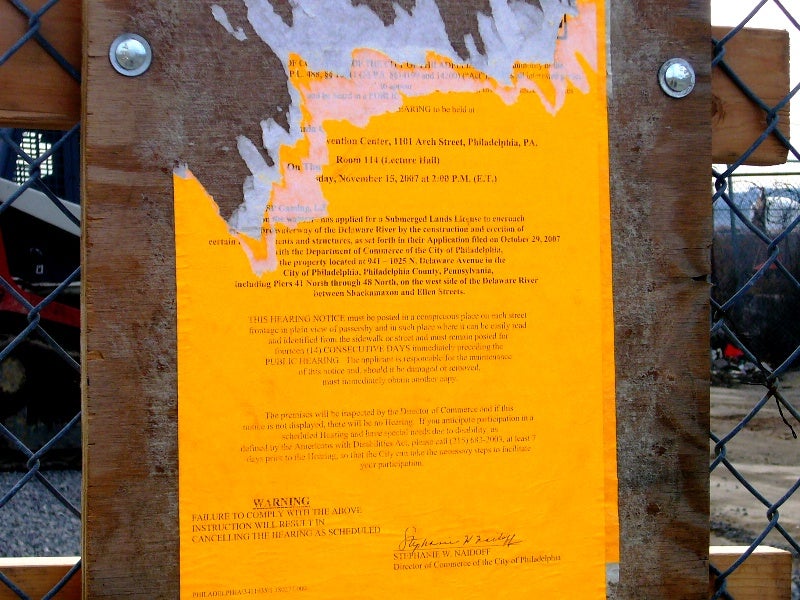Foxwoods to Court: Make city stop stalling

Commerce Dept. riparian permit posting – dated 2007 – at SugarHouse site
July 17
By Kellie Patrick Gates
For PlanPhilly
Foxwoods Casino has asked the State Supreme Court to make the city of Philadelphia issue the casino the permits it needs to build along the Delaware River.
In a petition filed Wednesday (see filings below), Foxwoods says the city has defied the Court’s April 2 order, in which the Justices ruled that the city had been intentionally stalling and should grant the permits and otherwise move the project forward. In the Wednesday filing, Foxwoods says that instead of following the court’s order to move forward, city officials and the mayor have publicly said they would work to prevent Foxwoods from building on its chosen site.
“Foxwoods has been forced to file this application seeking to have the Supreme Court enforce its order because we have been unable to get the City’s cooperation,” said James L. Dougherty, president and chief operating officer of Foxwoods Casino Philadelphia. “We have attempted to work with this administration and to follow the law, but the City has made it clear its goal is to force the re-siting of our casino, in direct violation of both the Gaming Act and the Supreme Court.”
The casino has asked the Court to appoint a Special Master – someone who would work with the city and the casino to resolve disputes.
Foxwoods’ filing elaborates on the sentiments the casino expressed to PlanPhilly last week, when spokeswoman Maureen Garrity said the city was intentionally slowing down the permitting process.
City officials said there’s been no unreasonable delay – just careful decision making.
Garrity pointed to Foxwoods’ attempt to get a zoning permit. The zoning permit is a big one, because it is a prerequisite for several other permits, including water and streets.
Foxwoods applied for a permit on May 5, Garrity said. The city then had 45 days to approve the permit, deny it, or approve it with conditions, she said.
“On the 44th day, they told us the application was incomplete,” Garrity said. The city wanted a traffic mitigation plan, a transportation plan, a parking plan, and the casino’s street layout changes.
Garrity said those items have not been required for zoning permit approval in the past. When Foxwoods brought this up to the city, she said, it was told there was a new policy in place that required all applications to include this sort of information at the outset.
“It’s not in the code,” Garrity said, and Foxwoods questions whether other developments have to meet this requirement.
Garrity also wonders why the city would wait until the 45-day clock had nearly expired before telling the casino more information was needed. If they had brought it up sooner, it could have been resolved sooner, she said.
“We feel like it’s a continued pattern of delay,” Garrity said.
It’s not delay, but careful consideration that’s happening, Terry Gillen, senior advisor to Mayor Nutter for Economic Development, said last week.
Gillen said she could not comment on the way the previous administration handled zoning permits. But “Mayor Nutter has said that on large projects, he wants these sorts of traffic issues resolved early in the process, with the Planning Commission at the table.” she said. In other words, prior to the issuance of a zoning permit.
The traffic-related issues the city wants Foxwoods to address are nothing new, she said. “When the Planning Commission approved the plan last summer, there was a lengthy discussion about traffic concerns. What we think is that those traffic concerns have to be resolved before zoning can move forward.”
Gillen said the city is requiring all large projects to resolve outstanding traffic and other issues prior to the issuance of the zoning permit, not just casinos. Gillen said that developers of all large projects are now “seeing the same level of review” and are “being asked to resolve their traffic problems” prior to receiving their zoning permits.
Earlier this week, Gillen called with two examples – A super-tall office building called the American Commerce Center at 1800 Arch Street and a hotel proposed for 40th and Pine, at the University of Pennsylvania.
Casino officials also said Wednesday that the regular meetings casino representatives had with various City departments under the Street administration “came to a halt under the current Administration. It often takes months for the administration to respond to requests for meetings. For months, Foxwoods was not permitted to meet with City departments and all requests had to be made through the Mayor’s senior advisor on economic development,” a press release states.
Gillen is that senior advisor.
When asked about these issues last week, Gillen said there is movement on casino requests, and city officials have daily conversations with staff from one casino or the other, Gillen said. “I spend a lot of time every day – as do many other city workers – thinking carefully about these issues,” Gillen said. When conditions are met, permits are granted, she said.
Gillen said the administration had earlier that week given SugarHouse a six-month renewal of its rough grading permit.
The original grading permit, which allows the casino to do limited site work, was issued in the waning days of the Street administration. Its issuance created a firestorm of criticism from critics who said the pro-casino Street administration pushed it through. When Nutter took office, he ordered a complete review of all casino-related decisions. Gillen is his casino point-person.
The Mayor has publicly said he would prefer if both casinos were built in locations other than their current waterfront properties. He will meet in coming weeks with the governor, local state lawmakers and casino principals to discuss alternatives, and
Gillen said he has some sites – which she could not discuss at this time – to suggest.
This is exactly the kind of thing that Foxwoods says the Supreme Court should see as a violation of its order. Foxwoods also gives the Mayor’s request of Penn Praxis to review the casino sites as evidence.
But Gillen said the city is also working to make the best decisions it can regarded the current sites, which were suggested by casino developers and approved by the state Gaming Control Board when it chose the two winning slots applicants for Philadelphia.
“We are looking closely at what we can do to make these locations better or, ideally, to find other locations, and to persuade the casinos they are better off moving,” Gillen said.
Gillen and other city officials had what she described as a productive meeting with a group of Foxwoods staffers and lawyers last week. “We agreed to keep working together on this issue, and I think they understand the city’s position,” she said.
When asked why the city waited until the 44th of the 45 days it had to consider the permit request to ask Foxwoods for more information, Gillen said, “I’m just going to say we’re complying with the law. We’re doing everything carefully, we’re doing everything legally, we’re doing everything as required.
“I’m sure that nothing moves as fast as they would like, but we’re being very careful.”
Both Foxwoods and SugarHouse have succeeded in legally challenging city leadership of intentional delays in the past. It was not the administration they accused in State Supreme Court lawsuits, but City Council. The Court awarded SugarHouse its Commercial Entertainment District status in November. In the first month of the Nutter administration, Councilman Frank DiCicco introduced legislation to grant Foxwoods its CED, provided the casino meet certain conditions. DiCicco took this step to prevent the Supreme Court from ruling in favor of Foxwoods, but it didn’t work. The Court awarded Foxwoods its CED in April.
Contact the reporter at kelliespatrick@gmail.com
WHYY is your source for fact-based, in-depth journalism and information. As a nonprofit organization, we rely on financial support from readers like you. Please give today.






